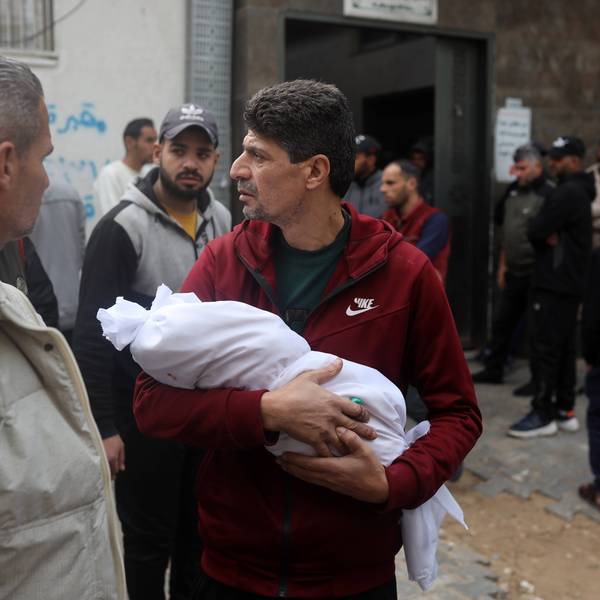As the international community marked World Press Freedom Day on Friday, journalists and advocates across the globe mourned and celebrated those killed in Israel's ongoing assault on the Gaza Strip.
The U.S.-based Committee to Protect Journalists (CPJ) has publicly
identified at least 97 media workers killed since Israel launched its retaliatory war on October 7: 92 Palestinian, three Lebanese, and two Israeli reporters.
"Since the Israel-Gaza war began, journalists have been paying the highest price—their lives—to defend our right to the truth. Each time a journalist dies or is injured, we lose a fragment of that truth," said CPJ program director Carlos Martínez de la Serna in a Friday statement. "Journalists are civilians who are protected by international humanitarian law in times of conflict. Those responsible for their deaths face dual trials: one under international law and another before history's unforgiving gaze."
Reporters Sans Frontières (RSF)—or Reporters Without Borders—puts the journalist death toll in Gaza above 100. Middle East Monitor reports at least 144 members of the press are among the 34,622 Palestinians that Israeli forces have killed in less than seven months in what the International Court of Justice has called a plausibly genocidal campaign.
RSF on Friday
released its annual Press Freedom Index. In its section on the Middle East, the group states:
Palestine (157th), the most dangerous country for reporters, is paying a high price. The Israel Defense Forces (IDF) have so far killed more than 100 journalists in Gaza, including at least 22 in the course of their work. Since the start of the war, Israel (101st) has been trying to suppress the reporting coming out of the besieged enclave while disinformation infiltrates its own media ecosystem.
At the war's six-month mark in April, Jonathan Dagher, head of RSF's Middle East desk,
declared that "this massacre must stop. Gaza's reporters must be protected, those who wish must be evacuated, and Gaza's gates must be opened to international media."
"The few reporters who have been able to leave bear witness to the same terrifying reality of journalists being attacked, injured, and killed," he continued, ripping the IDF for "silencing those who are driven by a duty to report the facts."
"RSF calls on the international community, its leaders, and its governments, to do everything to step up pressure on the Israeli authorities to end this disaster," Dagher added. "Palestinian journalism must be protected as a matter of urgency."
The Paris-based group
nominated Palestinian journalists covering Gaza for an annual award from the United Nations Educational, Scientific, and Cultural Organization (UNESCO)—an honor they received during a ceremony on Thursday.
"Each year, the UNESCO/Guillermo Cano Prize pays tribute to the courage of journalists facing difficult and dangerous circumstances,"
said Audrey Azoulay, the U.N. organization's director-general. "Once again this year, the prize reminds us of the importance of collective action to ensure that journalists around the world can continue to carry out their essential work to inform and investigate."
Nasser Abu Baker, president of the Palestinian Journalists' Syndicate and vice-president of the International Federation of Journalists, accepted the prize on behalf of his colleagues in the besieged enclave.
"Journalists in Gaza have endured a sustained attack by the Israeli army of unprecedented ferocity—but have continued to do their jobs, as witnesses to the carnage around them," he
said. "It is justified that they should be honored on World Press Freedom Day. What we have seen in Gaza is surely the most sustained and deadly attack on press freedom in history. This award shows that the world has not forgotten and salutes their sacrifice for information."
Mariam Abu Dagga, a 31-year-old photojournalist for the
Independent Arabic displaced in the southern Gaza city of Rafah, told CNN: "We are covering the war on Gaza because this is our journalistic duty. It is entrusted upon us... We challenged the Israeli occupation. We challenged the difficult circumstances and the reality of this war, a genocidal war."
"Whenever a journalist is targeted, we ask ourselves who among us will get their turn of being targeted tomorrow," said Abu Dagga, who also noted the emotional toll of tasks such as photographing children beneath the rubble.
While Israel has repeatedly
claimed—as it did to CNN on Friday—that "the IDF has never, and will never, deliberately target journalists," members of the press and others have cast doubt on such comments.
“For far too long Israel has been able to operate with impunity in the occupied Palestinian territory, and this has included occasionally killing reporters, like the Palestinian-American journalist Shireen Abu Akleh, in 2022," Simon Adams, president of the Center for Victims of Torture,
told the Inter Press Service.
Given the number of journalists killed in Gaza since October, he said, "to claim these deaths are accidental is not only incredulous, it is insulting to the memory of professionals who lived their lives in service of truth and accuracy."
Simon called for all journalist deaths in Gaza to be reported to the International Criminal Court and asserted that "World Press Freedom Day should be celebrated with a black armband this year."




